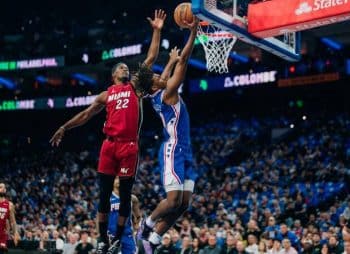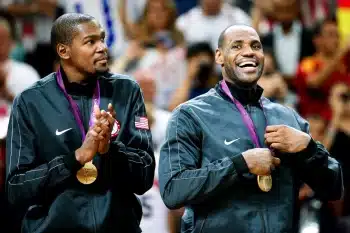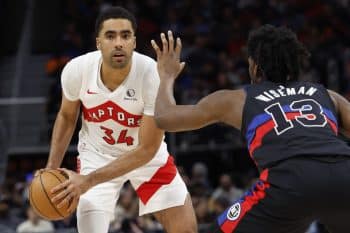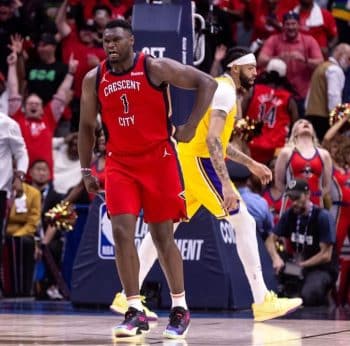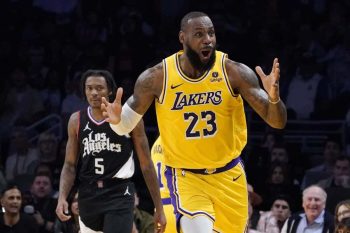NBA
Knicks Should be Sellers at Trade Deadline

Last week, Kristaps Porzingis let it be known that he wants the Knicks to be buyers at the upcoming trade deadline. His hope is that the Knicks can bring in vets that would help him make a push towards the playoffs.
“Playoff experience for myself individually would be huge at this point in my career — the sooner the better,” said Porzingis. “For myself, selfishly I would want to play in the playoffs, but we’ll see what happens and how we can end the season.”
Porzingis’ sentiments are certainly understandable. In fact, that’s what KP should want. Any competitive player worth their salt aims to be able to prove themselves under the bright lights and increased intensity of postseason basketball.
However, the Knicks should do the exact opposite. New York needs to be a seller at the deadline. Or, if the opportunity to part with veterans doesn’t arise, then stand pat.
While Porzingis, and his Knicks teammates and the team’s coaching staff will do all they can to win each game they play the rest of the season, New York’s front office has to look at the big picture.
Sacrificing a bit of the future in order to squeak into the playoffs and get possibly get swept out of the first round is not in the best case scenario for the long-term success of this franchise. In addition, there’s obviously no guarantee that chasing a playoff berth would result in securing a ticket to the dance. The worst place any NBA team can find themselves is finishing ninth in the conference.
The far preferred outcome is retaining all their picks and young players, securing as many ping pong balls as possible, and hoping to get lucky in next May’s draft lottery.
Yes, there are undeniable benefits of advancing into the postseason. Getting Porzingis and Frank Nitilinka some playoff seasoning would be terrific. No one would deny that. However, it should not come at the cost of future assets. And if the Knicks have the chance to flip Kyle O’Quinn, or Enes Kanter, or even Courtney Lee for a modest profit, they should pursue those opportunities.
Some Knicks fans are concerned that not doing everything possible to appease KP could result in Porzingis eventually fleeing New York. Janis Porzingis, who serves as Kristaps’ agent, suggested in an interview last summer that his brother may consider rejecting a max offer to put pressure on the Knicks. However, in reality, that outcome is highly unlikely.
This coming July, six months from now, the Knicks will be able to offer Porzingis a five-year max extension worth north of $156 million. Is Porzingis, who hasn’t exactly been a paragon of health over his first three NBA seasons, prepared to turn down that type of generational wealth? He’d be the first player to decline a full max rookie-scale extension. And even if KP were to reject the extension offer this summer, New York would still control his rights through the end of the 2019-20 campaign, as he would be a restricted free agent the following summer. Porzingis would have to wait until July 1st of 2020 to become an unrestricted free agent.
More importantly, if the Knicks play their cards right, it won’t be just money that keeps KP in NYC, which brings us back to the original point of this piece. Putting the Knicks in the best position going forward coincides with what’s best for their best player, their franchise cornerstone.
Let’s fast-forward six months, shall we? When KP sits down and examines whether he should sign an extension that would keep him in New York through the end of the 2024-25 season, he’ll weigh many factors. Yes, a playoff appearance this season would be nice. However, the 2018 NBA draft will take place the last week in June, just a few days before the Knicks can offer Porzingis a huge payday and an opportunity to commit to the team. While a trip to the postseason would be encouraging, adding a top-tier talent from the 2018 draft class would be far more beneficial to the long-term health of the franchise. A playoff appearance on the resume would be swell, but possibly having the chance to draft DeAndre Ayton, Marvin Bagley, Michael Porter, Trae Young, Luka Doncic or Mohamed Bamba would be much preferred.
Thus, Knicks president Steve Mills and GM Scott Perry have to do what’s best for the franchise, and that means ignoring the (understandable) desires of their young star. Mills and Perry have been around the league a long time. They are well aware that players don’t always know what’s best for their themselves or their team.
*****
I’ll quickly touch on one other topic, one which has generated some headlines in the New York tabloids of late. On Friday, it was announced that Joakim Noah and the Knicks had mutually agreed to part ways indefinitely. Adrian Wojnarowski of ESPN stated that he believed Noah might have already played his last game in a Knick uniform. The Knicks are reportedly considering their options and attempting to figure out how to divorce themselves from Noah. Those options include trading him, outright waiving him, agreeing to a buyout, or utilizing the stretch provision.
The Knicks are not going to find a team to inherit his bloated contract without attaching either Frank Ntilikina or a first-round draft pick. Fortunately, it appears they have no interest in going down that road.
Similarly, they should not consider using the stretch provision either.
Currently, New York doesn’t have a single player on their roster with a guaranteed contract that extends past the 2019-20 season (Tim Hardaway Jr. has a player option for 2020-21, and both Frank Ntilikina and Dameyean Dotson have team options for that season). However, if the Knicks were to stretch Joakim Noah at any point prior to the start of next season, they would owe him $7,565,000 over five years, beginning in 2018-19 and not concluding until 2022-23.
It’s a tough pill to swallow, but the Knicks should take their medicine over the next two seasons (Noah will be paid $18.5 million in 2018-19 and $19.3 million in 2019-20) and avoid unnecessarily clogging their cap well into the next decade. Going forward, the Knicks should steadfastly commit themselves to keeping their salary sheet clean past 2019. Even if they were to reduce Noah’s cap figure significantly this summer via the stretch provision, New York wouldn’t have enough cap space to make a big splash signing unless Enes Kanter also decided to opt out of his $18.6 million payer option.
There is a slim possibility it may make sense to stretch Noah in the summer of 2019, but only if it was absolutely necessary to create the cap space needed to ink a stud, top-tier free agent who had confirmed he was willing to sign. If New York stretched Noah in July of 2019, he would account for $6.4 million over an additional three seasons. Again, that would be something only worth considering in 2019, and only under a specific set of circumstances.
One other benefit of not stretching Noah is that his contract might have some value when there is just one year left on the deal. With the salary cap flattening/plateauing, we may see a throwback to the days when huge, expiring contracts were considered attractive assets to teams looking to clean up their books. (Shootout to the folks that remember “Theo Ratliff’s expiring contract”)
